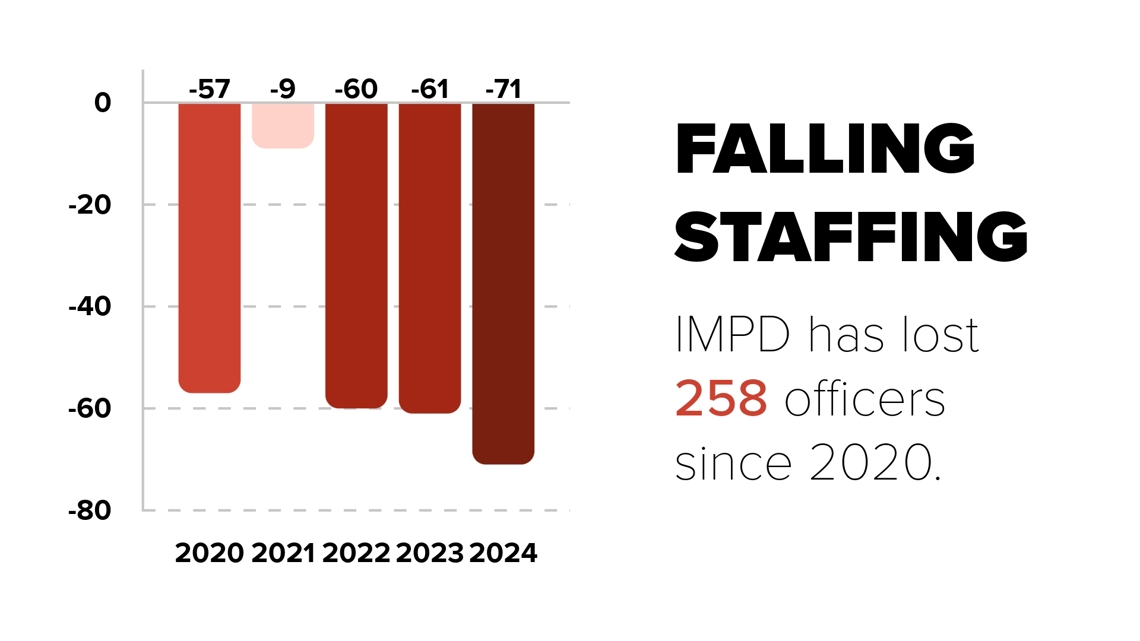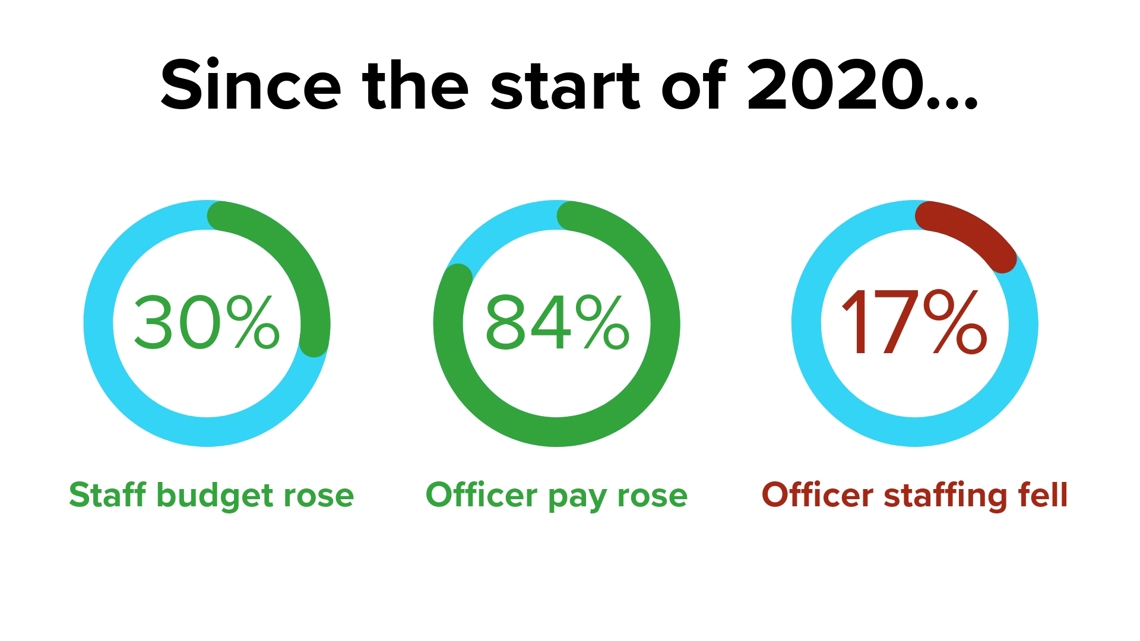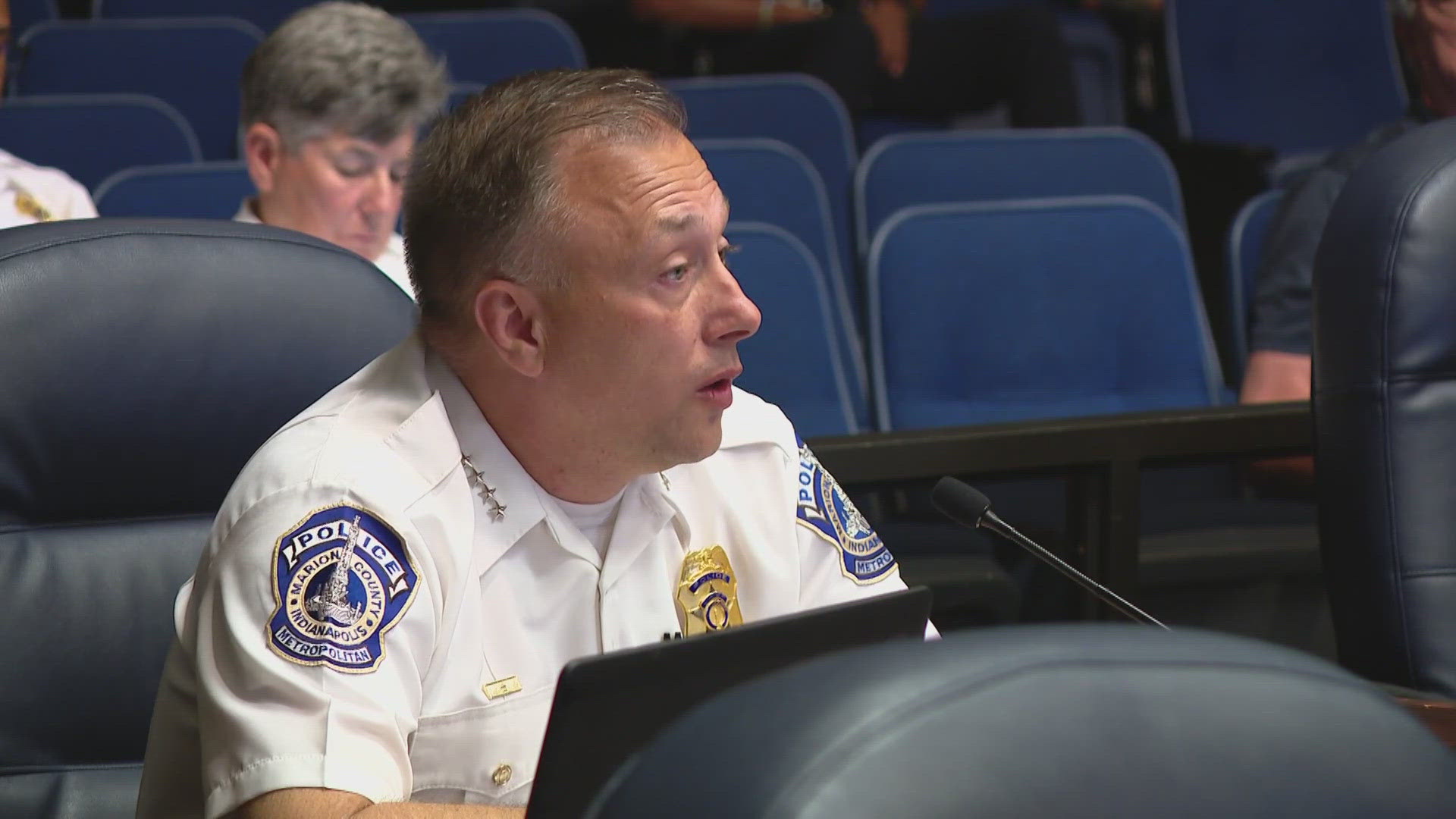INDIANAPOLIS — Indianapolis is experiencing an unprecedented shortage of sworn officers. At a budget meeting Wednesday, Sept. 11, Chief Chris Bailey said the force only has about 1,460 officers. It's budgeted for more than 1,700, and Bailey admitted even if they were fully staffed, it wouldn't be enough.
"I can tell you that even at 1,743, it's still not enough to do all the things we want to do, but we have to get to that point. I think that other cities, other major cities, have taken money from their police department, and they are paying that price now,” Bailey said.
But even 1,743 has proven to be an impossible goal.


“Currently we have the lowest number of sworn officers we have had in the history of IMPD,” Bailey said. “Right now, we have not slashed any of our services or told community members that we won’t be showing up on their particular run, but we are very close to that.”
More money, fewer officers
According to IMPD, the number of on-duty officers has fallen by 258 since the start of 2020. At the end of 2019, there were 1,716 sworn IMPD officers. That year, the force grew by 43. That was the highest year-end staffing in IMPD history — and the last year IMPD recruited more officers than it lost.
The overwhelming majority of IMPD's budget goes toward paying officers. In the proposed 2025 budget, IMPD is set to spend more than $271 million on officers (and seven support staff). That's 80% of the IMPD budget.
IMPD's budget has grown as staffing has fallen. The budget for 2020, when IMPD started off with peak staffing, included $211 million for officer pay. The budget has increased by 30%, even while real staffing has fallen by 17%.
That's because the pay for officers has increased to try and attract more. At the start of 2019, a new IMPD officer would start at $39,000 per year. That year, the pay increased to $51,000 per year, and has continued growing rapidly. This year, a starting officer makes almost $72,000 per year. That's an 84% increase.


A national police shortage
The reasons for the staffing shortage aren't clear. Nationally, there has been a sharp decline in the number of police officers. Resignations rose 47% between 2019 and 2020, according to a survey of 200 agencies nationwide. Retirements went up by 19% in the same time period. Last year, the police exodus seemed to slow, but the rate is still higher than before the COVID-19 pandemic.
At the same time, recruiting young people to become police officers has also been difficult. According to a report by the International Association of Chiefs of Police titled "The State of Recruitment: A Crisis for Law Enforcement," there are several reasons it's hard to recruit new young people. The report mentions the falling public image of police and the fact younger generations want work-life balance.
As the report put it, "mandated overtime and missing holidays with family are less appealing to Millennials and members of Generation Z."
Drawing attention to the problem
The Fraternal Order of Police (FOP) has keyed in on the recruitment problems for IMPD.
After the 2025 budget meeting, Indy FOP President Rick Snyder said, "we again call on local decision makers to pull out all of the stops to retain the officers we have so that we can attract new and experienced officers."
In April 2024, the FOP paid for a billboard near the West Street exit on eastbound Interstate 70, highlighting the shortage of officers.
“Our police officers in this city are overworked, they are understaffed and we are facing burnout,” Synder said. “We must pull out all the stops to focus on how we are going to retain the officers that we have as a triage before we ever talk about recruiting new officers.”
IMPD has been trying to adjust to the new realities. In addition to changing pay, the department now runs overlapping recruiting classes. Each class may be smaller, but they are holding more of them.
In March 2024, IMPD Assistant Chief Catherine Cummings told 13News, "I think there are so many people in our community who have the skill set to be really great officers, and I think they don’t necessarily realize that."
"I don’t want to confuse anybody," Cummings said. "This is an extremely difficult job, but it is so rewarding, and it’s a job that needs to be done.”

